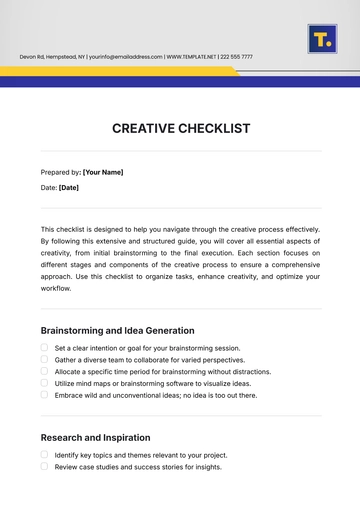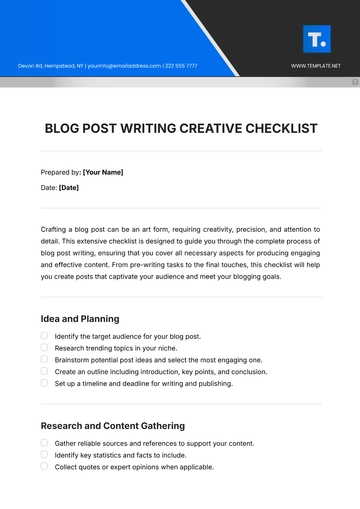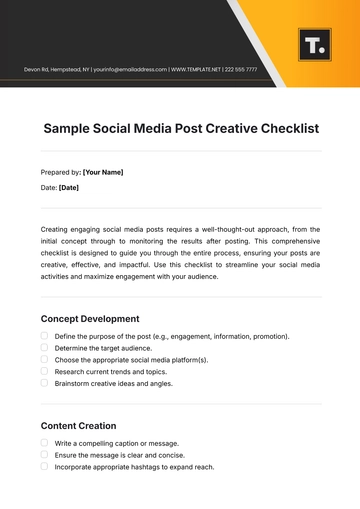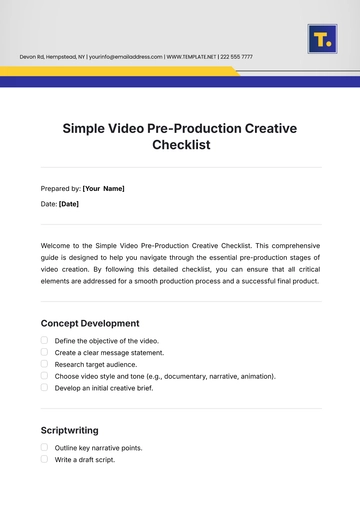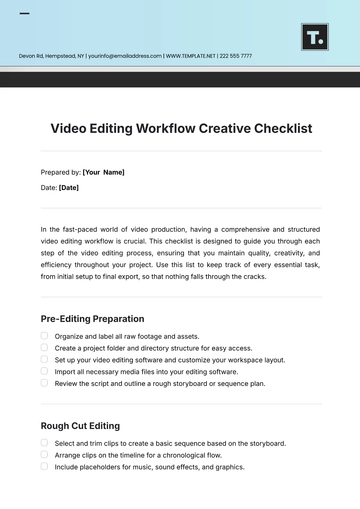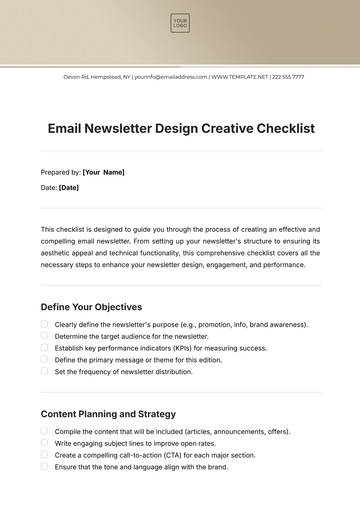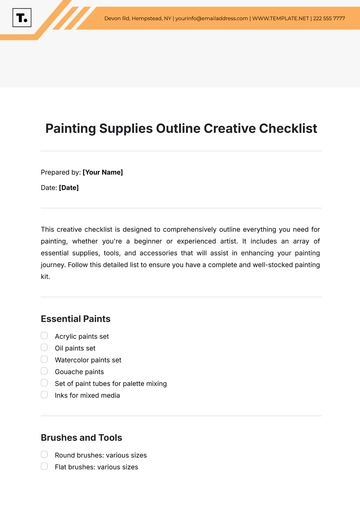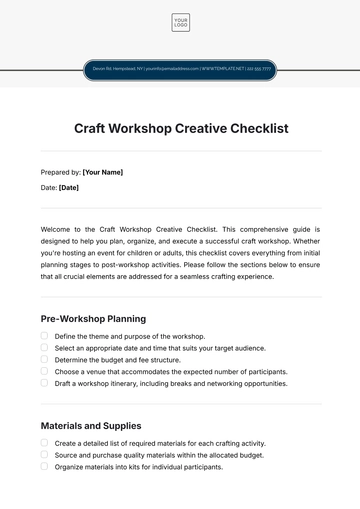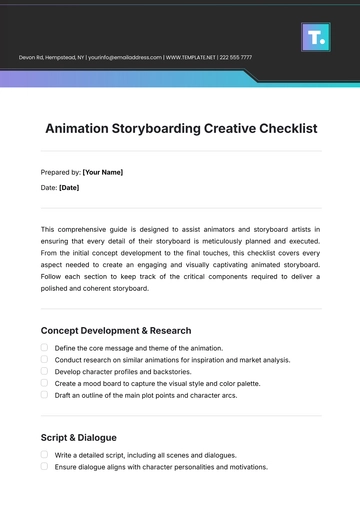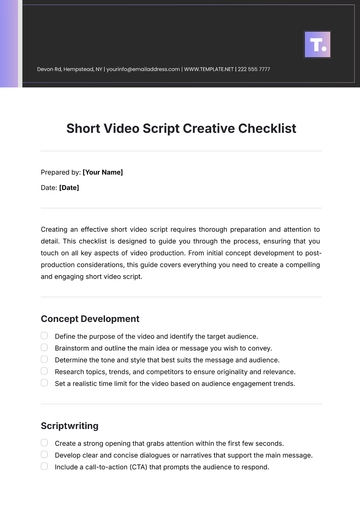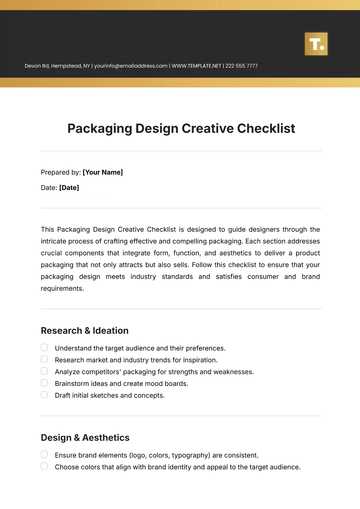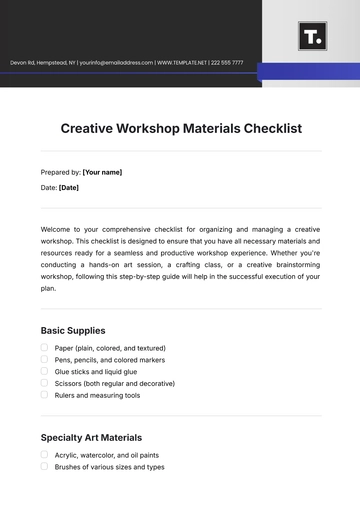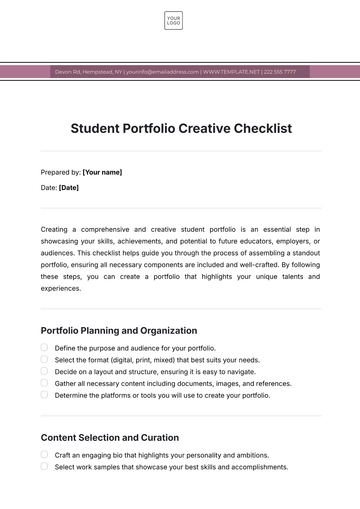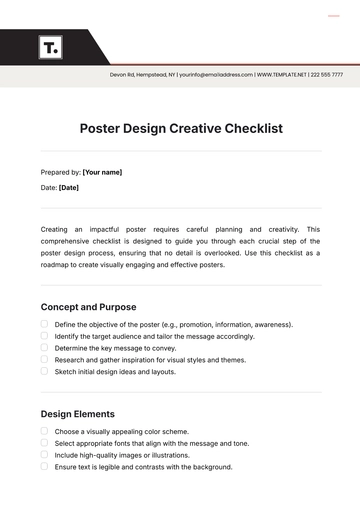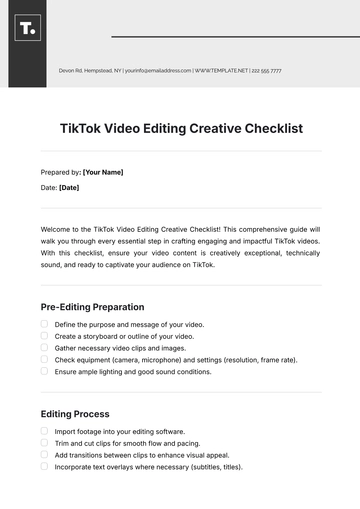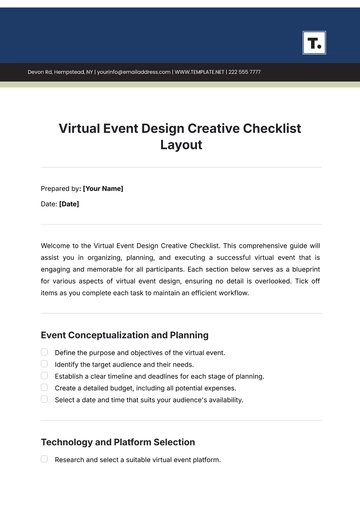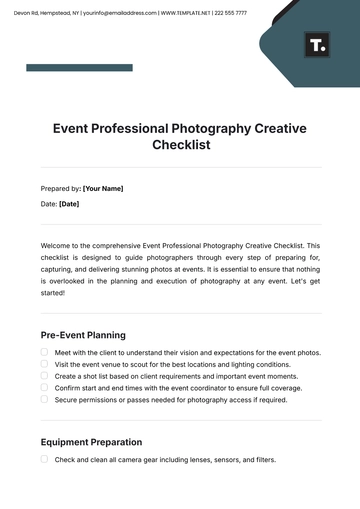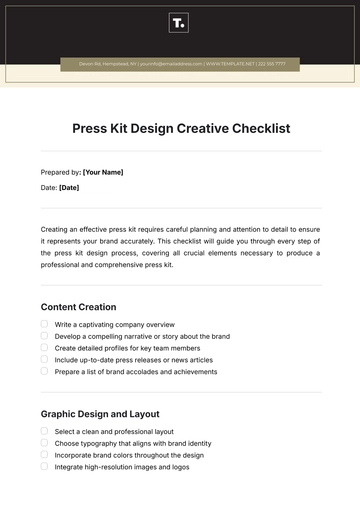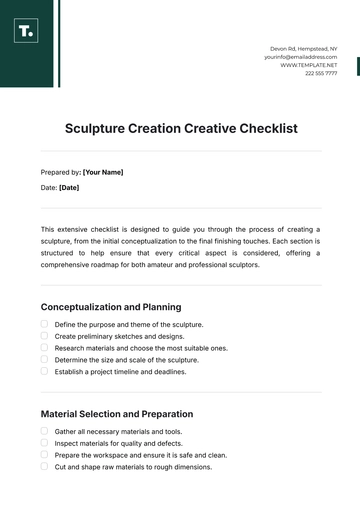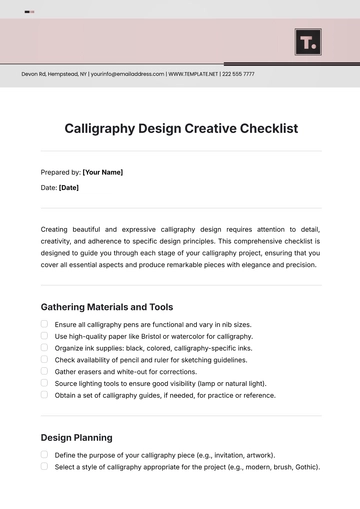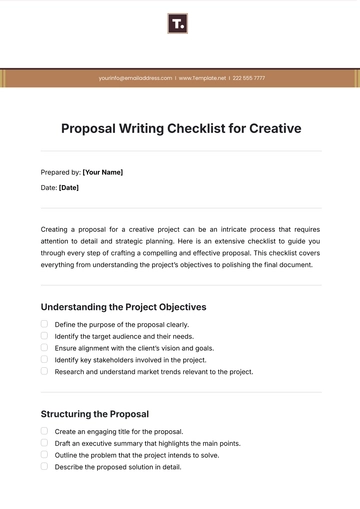Free Real Estate Staff Onboarding Checklist
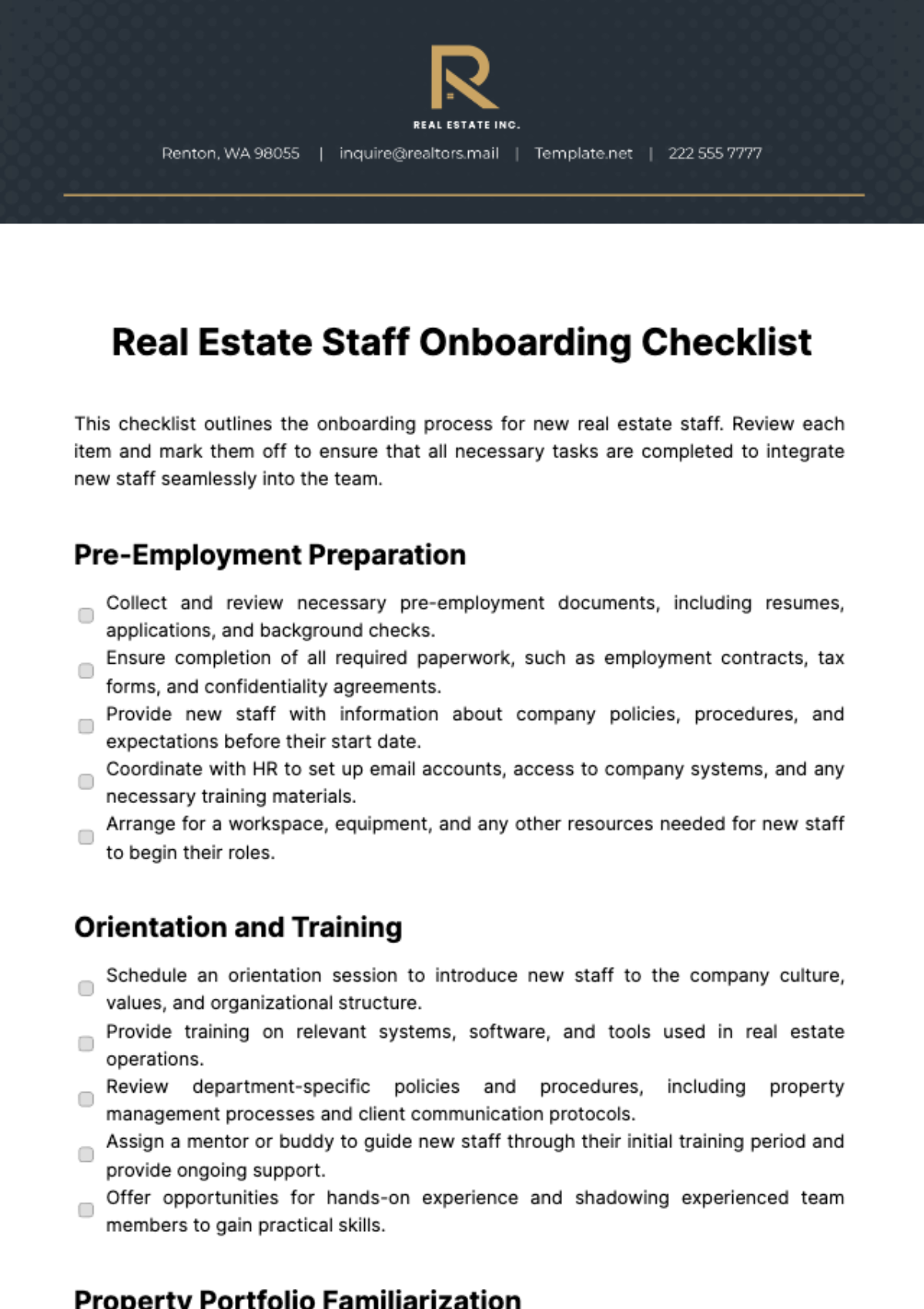
This checklist outlines the onboarding process for new real estate staff. Review each item and mark them off to ensure that all necessary tasks are completed to integrate new staff seamlessly into the team.
Pre-Employment Preparation
Collect and review necessary pre-employment documents, including resumes, applications, and background checks.
Ensure completion of all required paperwork, such as employment contracts, tax forms, and confidentiality agreements.
Provide new staff with information about company policies, procedures, and expectations before their start date.
Coordinate with HR to set up email accounts, access to company systems, and any necessary training materials.
Arrange for a workspace, equipment, and any other resources needed for new staff to begin their roles.
Orientation and Training
Schedule an orientation session to introduce new staff to the company culture, values, and organizational structure.
Provide training on relevant systems, software, and tools used in real estate operations.
Review department-specific policies and procedures, including property management processes and client communication protocols.
Assign a mentor or buddy to guide new staff through their initial training period and provide ongoing support.
Offer opportunities for hands-on experience and shadowing experienced team members to gain practical skills.
Property Portfolio Familiarization
Familiarize new staff with the company's property portfolio, including residential, commercial, and investment properties.
Provide detailed information about each property, including location, features, amenities, and current status.
Review property management procedures, leasing agreements, and tenant relations protocols.
Schedule site visits or virtual tours to give new staff firsthand experience with different properties.
Discuss the unique selling points and market positioning of each property to enhance sales and marketing efforts.
Client Relations and Communication
Educate new staff on the importance of building and maintaining positive relationships with clients, tenants, and stakeholders.
Provide guidelines for effective communication, including phone etiquette, email correspondence, and in-person interactions.
Review client management systems and protocols for tracking inquiries, leads, and client feedback.
Practice role-playing scenarios to simulate client interactions and develop interpersonal skills.
Emphasize the importance of professionalism, responsiveness, and customer service excellence in all client interactions.
Sales and Marketing Strategies
Train new staff on sales techniques, negotiation skills, and effective marketing strategies for real estate transactions.
Review the company's branding guidelines, marketing materials, and advertising channels.
Provide guidance on developing targeted marketing campaigns, including social media, print media, and online advertising.
Discuss strategies for identifying and qualifying leads, conducting property viewings, and closing sales.
Collaborate with the marketing team to develop personalized marketing plans for new staff to promote their services and listings.
Legal and Compliance Requirements
Educate new staff on legal and regulatory requirements related to real estate transactions, contracts, and disclosures.
Review fair housing laws, anti-discrimination policies, and ethical guidelines for real estate professionals.
Provide training on risk management practices, including identifying and mitigating potential legal liabilities.
Ensure new staff understand the importance of maintaining client confidentiality and protecting sensitive information.
Collaborate with legal counsel or compliance officers to address any questions or concerns related to legal and regulatory compliance.
- 100% Customizable, free editor
- Access 1 Million+ Templates, photo’s & graphics
- Download or share as a template
- Click and replace photos, graphics, text, backgrounds
- Resize, crop, AI write & more
- Access advanced editor
Streamline your onboarding process without the hassle of missing important items with our Real Estate Staff Onboarding Checklist Template! This customizable checklist from Template.net is editable, allowing you to create a thorough onboarding checklist! The AI Editor Tool simplifies the process, helping you maintain a smooth and efficient operation immediately!
You may also like
- Cleaning Checklist
- Daily Checklist
- Travel Checklist
- Self Care Checklist
- Risk Assessment Checklist
- Onboarding Checklist
- Quality Checklist
- Compliance Checklist
- Audit Checklist
- Registry Checklist
- HR Checklist
- Restaurant Checklist
- Checklist Layout
- Creative Checklist
- Sales Checklist
- Construction Checklist
- Task Checklist
- Professional Checklist
- Hotel Checklist
- Employee Checklist
- Moving Checklist
- Marketing Checklist
- Accounting Checklist
- Camping Checklist
- Packing Checklist
- Real Estate Checklist
- Cleaning Checklist Service
- New Employee Checklist
- Food Checklist
- Home Inspection Checklist
- Advertising Checklist
- Event Checklist
- SEO Checklist
- Assessment Checklist
- Inspection Checklist
- Baby Registry Checklist
- Induction Checklist
- Employee Training Checklist
- Medical Checklist
- Safety Checklist
- Site Checklist
- Job Checklist
- Service Checklist
- Nanny Checklist
- Building Checklist
- Work Checklist
- Office Checklist
- Training Checklist
- Website Checklist
- IT and Software Checklist
- Performance Checklist
- Project Checklist
- Startup Checklist
- Education Checklist
- Home Checklist
- School Checklist
- Maintenance Checklist
- Planning Checklist
- Manager Checklist
- Wedding Checklist
- Vehicle Checklist
- Travel Agency Checklist
- Vehicle Inspection Checklist
- Interior Design Checklist
- Backpacking Checklist
- Business Checklist
- Legal Checklist
- Nursing Home Checklist
- Weekly Checklist
- Recruitment Checklist
- Salon Checklist
- Baby Checklist
- Equipment Checklist
- Trade Show Checklist
- Party Checklist
- Hospital Bag Checklist
- Evaluation Checklist
- Agency Checklist
- First Apartment Checklist
- Hiring Checklist
- Opening Checklist
- Small Business Checklist
- Rental Checklist
- College Dorm Checklist
- New Puppy Checklist
- University Checklist
- Building Maintenance Checklist
- Work From Home Checklist
- Student Checklist
- Application Checklist
